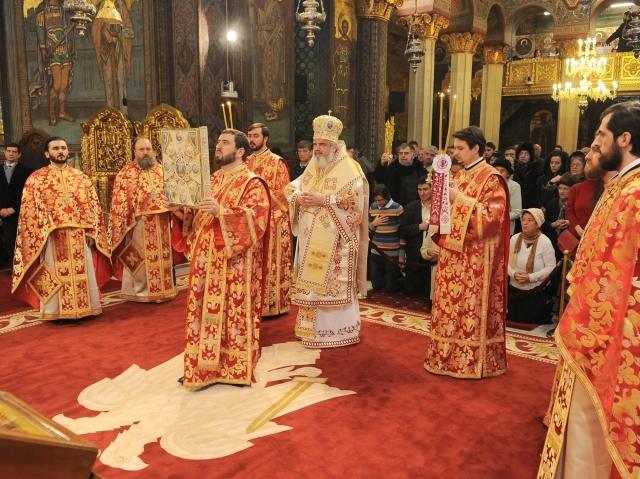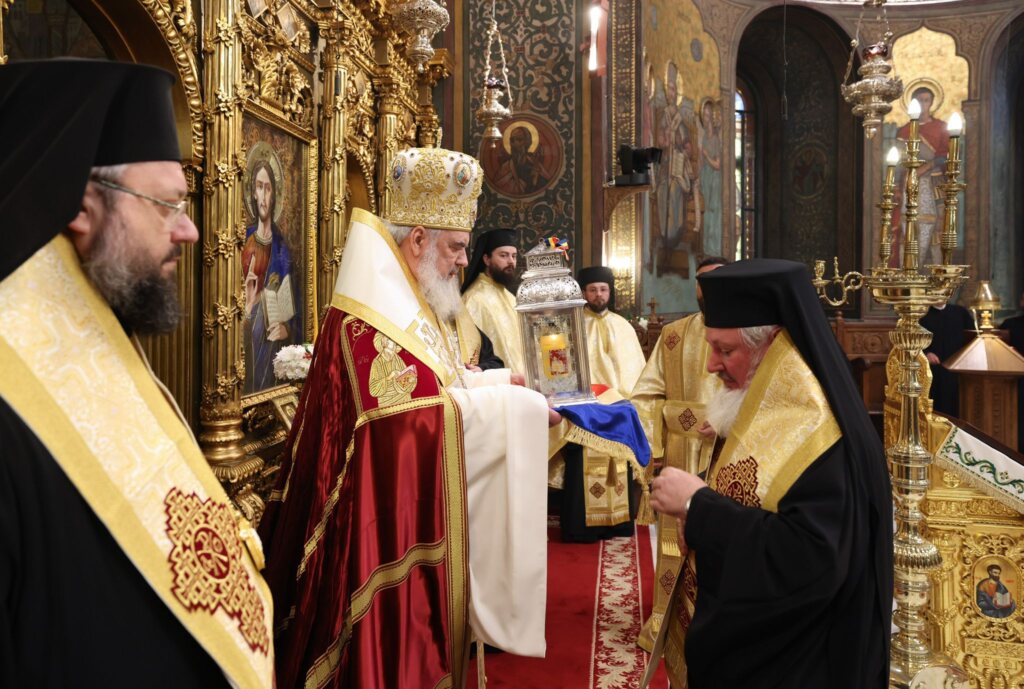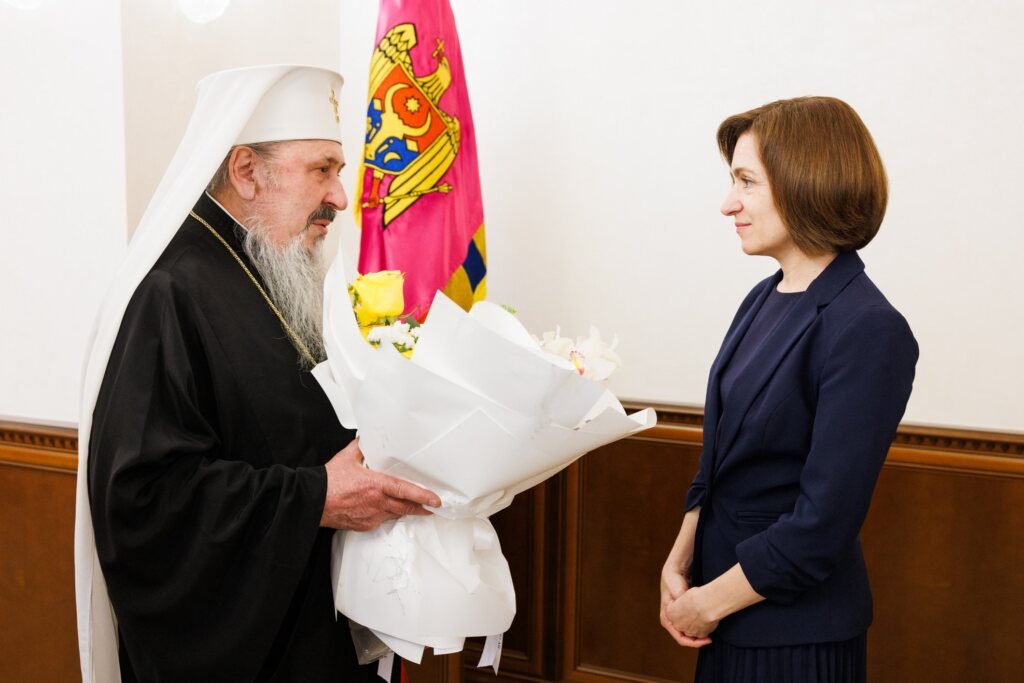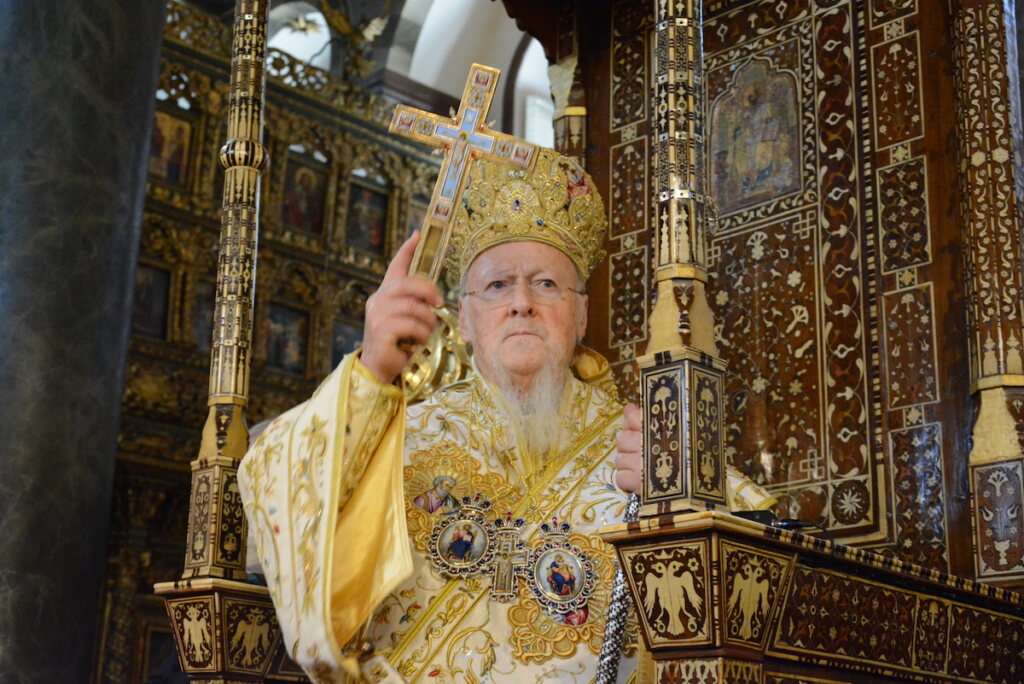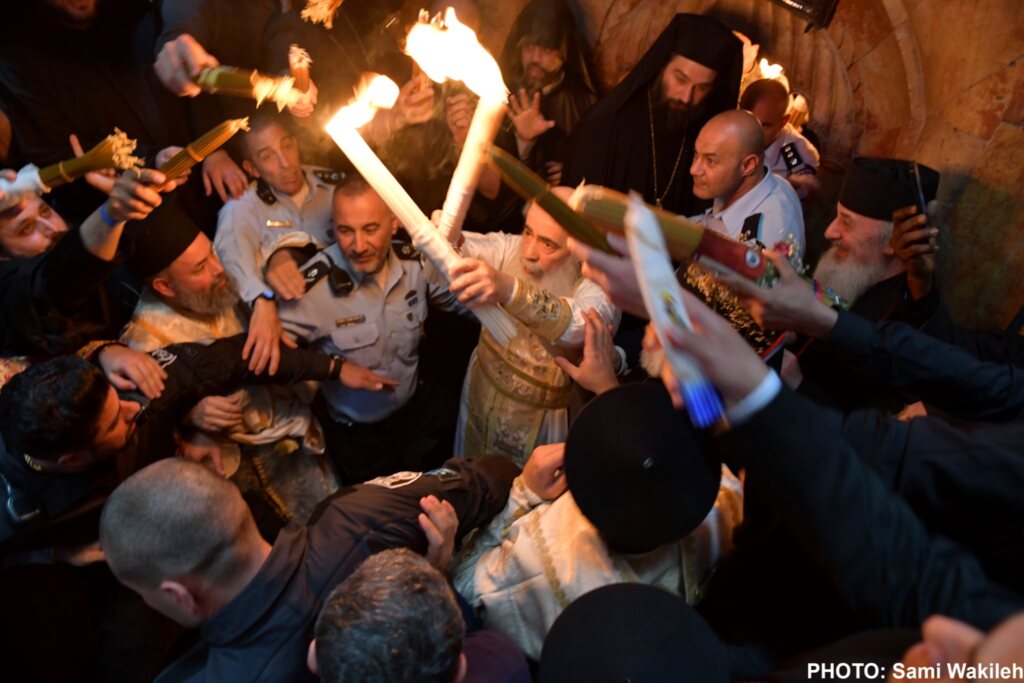The Orthodox Church celebrates on 30 November the Apostle Andrew, the First Called, Protector of Romania. The Divine Liturgy was celebrated at the Patriarchal Cathedral by His Beatitude Daniel, Patriarch of Romania, surrounded by a group of priests and deacons.
In the sermon delivered, His Beatitude spoke about the life and personality of the Apostle Andrew and the importance of this saint in the history of the Romanian people.
We have found the Messiah
The Patriarch of Romania spoke to those present about the calling of the disciples by the Saviour to preach showing that this call is a holy calling.
“From a disciple of St. John the Baptist, Saint Andrew became the first called by Christ the Lord to apostleship and therefore he is called in our books of worship and in the calendar the First Called and this shows that St. Andrew was in a search because he asked Jesus Rabi where do you live? Then Jesus told him Come and see. So it is a mutual search. St. Andrew is looking for the Messiah, and the Messiah is looking for St. Andrew in the sense of the call. When he brought his brother Peter to Jesus he said I found the Messiah – which translated means Christ or the Anointed the prophets prophesied about. This call of St. Andrew recounted in the Gospel of St. John the Evangelist, who in turn was a disciple of Saint Andrew, is particularly important to understand how Christ the Lord called the disciples to preaching with Holy Calling”, the Patriarch of the Romanian Orthodox Church said.
The Christianization brought about by Saint Andrew was a slow christening, but a sustainable one, not a spectacular, but a profound one.
In his address, the Primate of the Orthodox Church has shown that after Christ the Lord ascended into heaven, the apostles went to different parts of the world and preached the Gospel of salvation in Jesus Christ, the Gospel of the merciful love of God for people so that they may acquire eternal life, highlighting the fact that St. Andrew preached the word of God also in Scythia Minor – today Dobrogea.
“Saint Andrew the Apostle preached the Gospel in the Holy Land, then in Asia Minor – now Turkey – and then arrived in Scythia, in the west of the Black Sea – Scythia Minor is Dobrogea today and Great Scythia is today Ukraine. St. Apostle Andrew preached in these parts and he spent most of the time in Scythia Minor, i.e. today Dobrogea, where there is also a cave called the Cave of St. Andrew. There he took refuge when he was persecuted or was searched for spreading a new teaching. In this area of the country St. Apostle Andrew preached the Gospel and did not speak he was preaching in families; where there was a Christian family with a bigger house he would gather neighbours, he would gather those who were willing to listen and so he did a slow Christianization, but sustainable, not a spectacular one, but a deep one. In the history of the Universal Church there are evidences that St. Andrew preached in Dobrogea; Hippolytus of Rome, Origen, Eusebius and others spoke about it. The first Romanian who spoke about the presence and missionary work of St. Apostle Andrew in Dobrogea was St. Dosoftei, Metropolitan of Moldova, in The life and work of the saints”, said His Beatitude.
Saint Andrew the Apostle is considered the father of Romanian Christianity, the Apostle of the Romanians and the initiator of the Christianisation of our people
The Primate of the Romanian Orthodox Church emphasised that St. Andrew is considered the father of Romanian Christianity, the Apostle of the Romanians and the initiator of the Christianisation of our people: “We do not have a commanded christening by a king or prince, but a christening which starts at basis, starting from man to man, a slow Christianisation; while the Romanian people was forming it was also Christianising. ( … ) We as Romanians have a great joy namely to see that we actually received the faith from St. Apostle Andrew, the First Called, and, therefore, our faith is apostolic faith received from the first called Apostle of the Lord. It is an honour and also a great responsibility to continue the missionary work of St. Apostle Andrew as it developed over the centuries. St. Apostle Andrew has a special bond with the Romanian people. It seems that he suffered a martyr’s death during the persecutions of Emperor Nero in 64-66 year, or during the persecution of Emperor Dometian who persecuted also St. Apostle John. We do not know exactly the year in which St. Apostle Andrew suffered a martyr’s death, but what is accurate is that he preached the Gospel on the territory of our country.
The relics of Saint Apostle Andrew, the First Called, for the first time in Romania in 1996
His Beatitude emphasized that bringing the relics of St. Andrew, in 1996, in Iași produced great spiritual joy to Romanians and so great was the enthusiasm of the faithful by learning that our Apostle is present through his head brought from Patras that a number so high was never seen at the patron feast of St. Paraskeva.
“Taking into account this special bond between Saint Apostle Andrew and the Romanian people that was formed from our ancestors Geto- Dacians and Romans, the Holy Synod of the Romanian Orthodox Church in 1995 to put the red cross in the calendar in remembrance of Saint Andrew, a date that until then was an ordinary day, written in black on the calendar. The following year, in 1996, after we visited the Metropolis of Patras, the then Metropolitan, His Eminence Nicodemus, came to Iași and then returned in autumn at the feast of St. Mother Paraskeva bringing the head of Saint Apostle Andrew. It was the first time that Saint Apostle Andrew came back to Romania through his head, as holy relics. A special troparion was composed because His Eminence Metropolitan Nicodemus of Patras was a very good musician. Then the Romanian people first met his Apostle, there was a tremendous excitement during the feast of Saint Pious Paraskevi and Saint Andrew remained in Iași and then went to Galați for several days between 12 and 19 October. So great was the enthusiasm of the faithful to know that our Apostle is present through his head brought from Patras that there was never such a high number at the patron feast of St. Paraskeva”.
Feast of Saint Apostle Andrew, the First Called, Protector of Romania – national religious feast and national holiday of Romania
His Beatitude talked about the steps the Romanian Orthodox Church has taken so that the feast of St. Andrew become the country’s national holiday.
“At our proposal, the following year, in 1997, the Holy Synod of the Romanian Orthodox Church, put in the calendar, in remembrance of 2001, the Holy Synod decided that the commemoration of St. Andrew the Apostle be declared a national holiday and to take steps with the state authorities that it will become also a national holiday of our country. There were several steps taken from 2001 and only in 2011 the Parliament debated this proposal of ours after the head of St. Andrew was brought also to Bucharest in 2011. From there it went to Sibiu and in the presence of the Head of St. Andrew in Sibiu, in October 2011, Andrei Șaguna was proclaimed saint who is commemorated today with St. Andrew, Protector of Romania, then to Alba Iulia where Bishop Simeon Ștefan of Transylvania was proclaimed saint. So great joy was in 1996 when he returned for the first time to Romania and again in 2011 when he came to Bucharest and Transylvania. The following year, by Law 147 of 23 July 2012, at the insistence of the Church, the Romanian Parliament declared 30 November as a non-working day of public holidays”, said the Patriarch.
St. Andrew the Apostle reminds us that we are a people with a faith of apostolic origin
At the same time, the Patriarch of the Romanian Orthodox Church has shown the link between the day to honour Saint Apostle Andrew and the 1st of December, highlighting the fact that St. Andrew the Apostle reminds us that we are a people with a faith of apostolic origin: “We have 30 November as the feast of Christianisation of the Romanian people by the remembrance of Saint Apostle Andrew, Protector of Romania, and the National Day on the 1st of December. We have two days close to each other: 30 November which is the day of our spiritual unity in the apostolic faith and 1 December, our day of national unity through the patriotic will. St. Andrew the Apostle reminds us that we are a people with a faith of apostolic origin, a people who retained this apostolic faith despite many trials and tribulations, especially during the invasion of migratory peoples who, having passed over the territory of our country, failed to take away from us the apostolic faith received from St. Andrew”.
“Since St. Andrew came to Iași, his devotion or veneration intensified together with the growing of missionary consciousness. We must work harder to preach the Gospel, we must help the poor more in order to put into practice the Gospel of the merciful love of Christ so that St. Andrew became the light of the Church’s missionary work in a more accentuated manner. Many children took the name Andrew or Andreea, parents gave them the name of Andrew, Andreea, or derived, after his arrival in Iasi in 1996, so that today there are over 700,000 Romanians named after St. Andrew and to all we want to wish many years of good health and hope that they have the same zeal and love for Christ and His Church as had St. Andrew and which he transmitted to us for the glory of the Most Holy Trinity and for our salvation”, the Patriarch said.
The reliquary with a fragment of the relics of Saint Apostle Andrew, Protector of Romania, which is in the Chapel of the Patriarchal Residence, was brought and placed for veneration of the faithful, in the Patriarchal Cathedral.
St. Andrew the First-Called was a native of Bethsaida (city on the western shore of Lake Gennesaret – Galilee) and was the brother of Peter, the fisherman Jonah’s two sons. He was a disciple of St. John the Baptist, and at the urging of his teacher went with John, son of Zebedee, to seek Him, who the Forerunner said that He was ‘the Lamb of God’.
